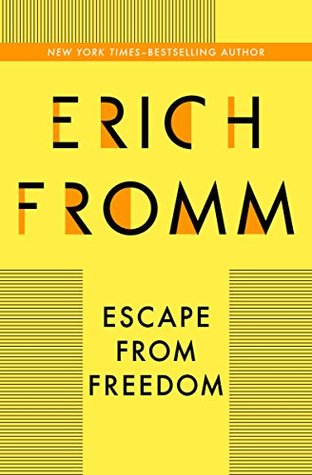More on this book
Community
Kindle Notes & Highlights
We believe, for instance, that freedom of worship constitutes one of the final victories for freedom. We do not sufficiently recognize that while it is a victory against those powers of Church and State which did not allow man to worship according to his own conscience, the modern individual has lost to a great extent the inner capacity to have faith in anything which is not provable by the methods of the natural sciences.
This particular mechanism is the solution that the majority of normal individuals find in modern society. To put it briefly, the individual ceases to be himself; he adopts entirely the kind of personality offered to him by cultural patterns; and he therefore becomes exactly as all others are and as they expect him to be. The discrepancy between “I” and the world disappears and with it the conscious fear of aloneness and powerlessness.
This can be studied in rationalizations which tend to explain an action or a feeling on rational and realistic grounds, although it is actually determined by irrational and subjective factors. The rationalization may be in contradiction to facts or to the rules of logical thinking. But frequently it will be logical and rational in itself; then its irrationality lies only in the fact that it is not the real motive of the action which it pretends to have caused.
The thought that is the result of active thinking is always new and original; original, not necessarily in the sense that others have not thought it before, but always in the sense that the person who thinks has used thinking as a tool to discover something new in the world outside or inside of himself.
Our own era simply denies death and with it one fundamental aspect of life. Instead of allowing the awareness of death and suffering to become one of the strongest incentives for life, the basis for human solidarity, and an experience without which joy and enthusiasm lack intensity and depth, the individual is forced to repress it. But,
Many psychiatrists, including psychoanalysts, have painted the picture of a “normal” personality which is never too sad, too angry, or too excited. They use words like “infantile” or “neurotic” to denounce traits or types of personalities that do not conform with the conventional pattern of a “normal” individual. This kind of influence is in a way more dangerous than the older and franker forms of name-calling. Then the individual knew at least that there was some person or some doctrine which criticized him and he could fight back. But who can fight back at “science”?
As a child, every human being passes through a state of powerlessness, and truth is one of the strongest weapons of those who have no power.
Or is there a state of positive freedom in which the individual exists as an independent self and yet is not isolated but united with the world, with other men, and nature?
Ours is only that to which we are genuinely related by our creative activity, be it a person or an inanimate object.
The emphasis thus shifts from the present satisfaction of creative activity to the value of the finished product. Thereby man misses the only satisfaction that can give him real happiness—the experience of the activity of the present moment—and chases after a phantom that leaves him disappointed as soon as he believes he has caught it—the illusory happiness called success.
there is only one meaning of life: the act of living itself.
In the relation between the man who buys and the one who sells, the concrete differences of personality are eliminated.
The victory of freedom is possible only if democracy develops into a society in which the individual, his growth and happiness, is the aim and purpose of culture, in which life does not need any justification in success or anything else, and in which the individual is not subordinated to or manipulated by any power outside of himself, be it the State or the economic machine; finally, a society in which his conscience and ideals are not the internalization of external demands, but are really his and express the aims that result from the peculiarity of his self.


